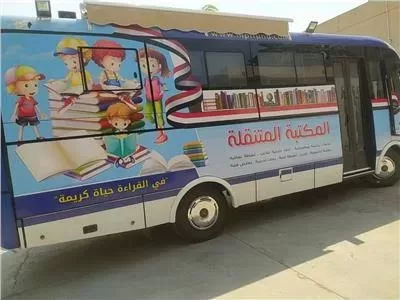For bibliophiles in the capital, the Cairo International Book Fair that is usually held in January every year is the go-to place for reading material at reasonable prices.
But for book lovers in other governorates across the nation feel that the long trip to Cairo is not worth the effort. Individual initiatives come to the rescue for both children and adults who run after good books to read.
However, with the launch of the presidential “Hayah Karima” (Decent Life) in 2019 targeting development of the rural areas and communities around the country, the Ministry of Culture has been working on several programmes to make reading and other cultural activities accessible to young people.
The ministry last month announced that mobile libraries with rich collections of books will soon find their way to five border governorates. The governorates of North Sinai, Matrouh, Aswan, the New Valley and the Red Sea will also have a chance to engage in fun activities, shows, art exhibitions, handicraft workshops, painting and drawing.
This is not the first time that mobile libraries are doing the rounds in Egypt. In 2018, Inas Abdel Dayem, the then culture minister, spearheaded the first-ever launch of mobile libraries with Al-Asmarat neighbourhood of Cairo’s Moqattam district as the first destination.
Haitham Sayyed, 43, an English teacher, said he was brought up in a village in Sharqia governorate, and when he was still young he noticed that he and those of his age had far less reading material than peers in the big cities.
Large cities have cultural centres and public libraries, whereas a typical village would only have a school library, rarely visited by children, Sayyed added. He noted that the area where he was brought up encompassed 20 villages, with a total population of about 40,000 people, but no single public or private cultural centre.
“The cultural centres in cities were too far away for us, and so we could not go. This has led to a decline in cultural awareness in rural areas,” Sayyed noted.
“Now, the Ministry of Culture aims to offer valuable and direly needed cultural services accessible in all parts of the country, mainly for the most deprived, with multiple artistic and cultural activities, including mobile theatres, street storytelling and book kiosks,” he added.
Sayyed hopes that the mobile libraries initiative would bridge the cultural gap between children and youth in villages and cities.
Educational expert Kamal Moghith said that mobile libraries contribute to enriching knowledge for youngsters nationwide.
“But in order to make sure that children read more books, the content in libraries should be suitable for all ages in terms of the language used because in some cases it is too difficult for them to read,” Moghith told The Egyptian Gazette.
“Festivals, cultural fairs and cinemas should also be organised in all Egyptian governorates,” Moghith added.
Greater attention has to be given to reading at school instead of leaving children trapped in internet games or foreign cartoons broadcast throughout the day on some satellite channels, he said.






Discussion about this post